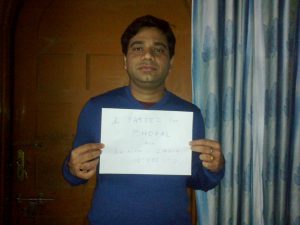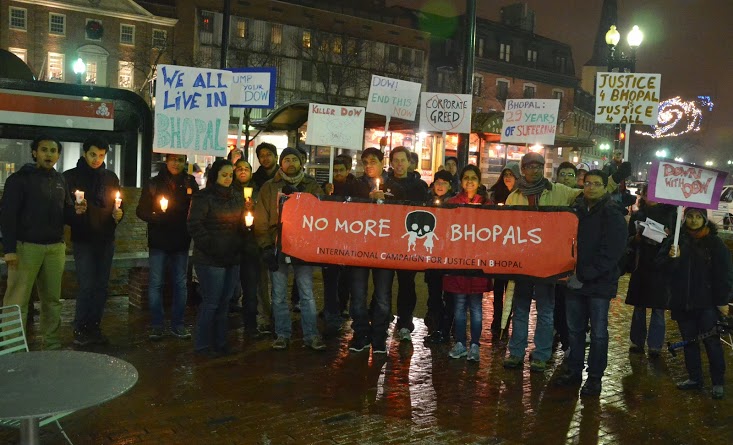
As the city slept, the killer silently crept in. From the windows, doors, ledges and crevices, it came in silently to kill. It killed, it maimed, not in hundreds but in hundreds of thousands. The killer’s name was methyl isocyanate and in four hours it killed 8,000 innocent people instantly and maimed another 200,000.
On the midnight of Dec. 3, 1984 in Bhopal, India; 27 tons of methyl isocyanate, a lethal gas, leaked from a pesticide plant owned by the Union Carbide Corporation (UC), killing, poisoning and blinding hundreds of thousands of people.
After stalling the matter in legal and bureaucratic circles in India and the United States; in 1989, Union Carbide negotiated a deal with the Indian government, paying just $400 to each victim. The deal was struck with no consultation with survivor groups and vastly undercounted the people affected. Beyond this, Union Carbide refused to take any responsibility for the disaster and even went to the extent of blaming the entire disaster on a supposedly disgruntled Indian employee who caused the leak. In 2001, UC was acquired by Dow Chemical which too refused to acknowledge any responsibility.
Twenty nine years after the disaster, the death toll is above 25,000 and counting, while 100,000 people still suffer from chronic, debilitating, exposure-related illnesses. Union Carbide left without cleaning its factory. The company abandoned huge quantities of lethal chemicals at the site and bulldozed thousands of tons of highly toxic wastes into huge solar evaporation ponds. These chemicals are leaking into the water supply of some 30,000 people living near the plant. Rates of cancers and birth defects have soared. Union Carbide and its owner Dow Chemical refuse to take notice.
The extent of the impunity can be gauged from a news article written weeks after the gas disaster which records how American lawyers descended on Bhopal, promising vast sums to people still half blind from the gas and who could not in any case read. Prominent among these was Melvin Belli, the flamboyant attorney from San Francisco, whose law firm had represented many famous people. Belli reeled off the names of film stars, and then allegedly added: ‘But these people in India are nobodies. Some poor little bastard living in a railroad shack goes home to find his wife and child dead. Now Union Carbide has the effrontery to offer a fucking orphanage and a million dollars. It is a monumental goof.’
A great catastrophe, followed by years of sickness, poverty and injustice can overwhelm and crush the human spirit, or it can enable ordinary people to discover that they are extraordinary. For nearly three decades, some of the poorest people on earth – sick, on the edge of starvation, illiterate and without funds, powerful friends or political influence – have struggled for their lives against the world’s biggest chemical corporations, their allies in the US and Indian governments and an army of hired lawyers, lobbyists and PR agents. Undaunted by these odds or the depth of their long suffering, the Bhopali survivors have never given up their struggle for justice. Most can look back on a lifetime of street demos, sit-ins, roadblocks, boycotts, hunger-strikes with and without water. They’ve staged exhibitions, satirical awards, concerts, street theatre and created some of the most extraordinary protest art ever seen.
As the 29th anniversary came and went without as much as a whisker of a remembrance in India or the U.S, it seems that the world has chosen to forget the worst ongoing industrial disaster. The two governments of India and United States have chosen to ignore the hundreds of thousands of poor people who have suffered and continue to suffer. Dow Chemicals (formerly Union Carbide) has decided that $400 is compensation enough for losing a family member. They don’t believe that cleaning their mess is worth any more of their precious dollars.
The struggles of ordinary people to assert their fundamental human rights in face of the power, greed and heartlessness of giant corporations will be the defining battle of the 21st century. The struggle for justice in Bhopal is in the front line of that battle. Some of that battle is fought in the courts, others on the streets, but the crucial battlefield is the heart.
And heart is where the struggle touched a motley group of Harvard students who, upon hearing the story directly from some of the survivors as part of an event at the Harvard Kennedy School, decided to join the International Campaign for Justice in Bhopal (ICJB) and other community organizations in their struggle to bring justice to Bhopal survivors.
To draw attention to the ongoing struggle a candlelight vigil and protest was organized at Harvard Square, Cambridge to commemorate the 29th anniversary of the disaster. In order to build widespread support and awareness for the cause a 365-day global relay fast was also launched. The goal of the fast is to draw attention to key survivor demands: clean-up of the contaminated site, medical relief and economic rehabilitation of all survivors, and prosecution of Dow Chemical, whose subsidiary Union Carbide’s pesticide factory was the site of the 1984 disaster.
Speaking on the occasion of the anniversary, Harvard graduate student Arif Hussain said, “The fast is both a means of expressing our collective outrage over what is happening in Bhopal as well as a vehicle to globally amplify the voices of the survivors.”
Leonid Chindelevitch, an ICJB volunteer, said that Dow’s irresponsibility is setting a dangerous precedent for the future behavior of transnational corporations by showing that they can escape from liability for social and environmental harm caused by their actions.
While the situation on the ground in Bhopal is grim, Nitin Gujaran, an AID volunteer and a software engineer working in the area is hopeful that the 30th anniversary year will energize a global movement for justice in Bhopal as well as increase awareness about other such disasters.
Bhopal is a grim reminder to us all that we live in a profit maximizing, toxic, industrial society which – if not held accountable – can lead to unimaginable human disasters. In some ways, we all live in Bhopal.
The ongoing fast is just a small collective effort towards raising a voice to hold Dow accountable and providing justice for victims of Bhopal. To support the cause, sign up for a day of fast in solidarity with victims of Bhopal by clicking here.
